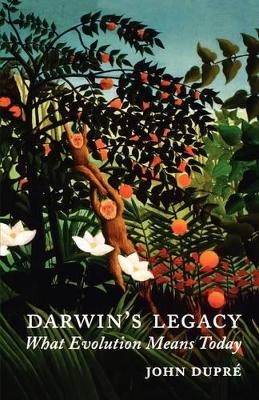
Darwin's Legacy
What Evolution Means Today
Seiten
2005
Oxford University Press (Verlag)
978-0-19-928421-4 (ISBN)
Oxford University Press (Verlag)
978-0-19-928421-4 (ISBN)
Presents an introduction to evolution and what it means for our view of humanity, the natural world, and religion. This book explains the right and the wrong ways to understand evolution. It is suitable for those interested in the understanding what the theory of evolution can and can't do.
Charles Darwin transformed our understanding of the universe and our place in it with his development of the theory of evolution. 150 years later, we are still puzzling over the implications. John Dupré presents a lucid, witty introduction to evolution and what it means for our view of humanity, the natural world, and religion. He explains the right and the wrong ways to understand evolution: in the latter category fall most of the claims of evolutionary psychology, of which Dupré gives a withering critique. He shows why the theory of evolution is one of the most important scientific ideas of all time, but makes clear that it can't explain everything - contrary to widespread popular belief, it has very little to tell us about the details of human nature and human behaviour, such as language, culture, and sexuality.
Darwin's Legacy clears a path through the confusion and controversy surrounding evolution; anyone who is interested in understanding what the theory of evolution can and can't do will find this a compelling and enjoyable introduction.
Charles Darwin transformed our understanding of the universe and our place in it with his development of the theory of evolution. 150 years later, we are still puzzling over the implications. John Dupré presents a lucid, witty introduction to evolution and what it means for our view of humanity, the natural world, and religion. He explains the right and the wrong ways to understand evolution: in the latter category fall most of the claims of evolutionary psychology, of which Dupré gives a withering critique. He shows why the theory of evolution is one of the most important scientific ideas of all time, but makes clear that it can't explain everything - contrary to widespread popular belief, it has very little to tell us about the details of human nature and human behaviour, such as language, culture, and sexuality.
Darwin's Legacy clears a path through the confusion and controversy surrounding evolution; anyone who is interested in understanding what the theory of evolution can and can't do will find this a compelling and enjoyable introduction.
John A. Dupr is Professor of Philosophy of Science & Director of the ESRC Centre for Genomics in Society at the University of Exeter. He lectures extensively in the U.K., North America, and Europe. His main area of research is the philosophy of science with special interest in the philosophy of biology, the role of values in science, and the nature of biological species. His books include Human Nature and the Limits of Science (OUP).
1. Introduction ; 2. What is the theory of evolution? ; 3. What is the theory of evolution good for? ; 4. Human origins and the decline of theism ; 5. Humans and other animals ; 6. Human nature ; 7. Race and gender ; 8. Conclusion
| Erscheint lt. Verlag | 28.7.2005 |
|---|---|
| Verlagsort | Oxford |
| Sprache | englisch |
| Maße | 130 x 196 mm |
| Gewicht | 369 g |
| Themenwelt | Sachbuch/Ratgeber ► Natur / Technik |
| Geisteswissenschaften ► Philosophie | |
| Geisteswissenschaften ► Psychologie ► Allgemeine Psychologie | |
| Naturwissenschaften ► Biologie ► Evolution | |
| ISBN-10 | 0-19-928421-0 / 0199284210 |
| ISBN-13 | 978-0-19-928421-4 / 9780199284214 |
| Zustand | Neuware |
| Haben Sie eine Frage zum Produkt? |
Mehr entdecken
aus dem Bereich
aus dem Bereich
Techniken der Verhaltenstherapie
Buch (2024)
Julius Beltz GmbH & Co. KG (Verlag)
35,00 €


